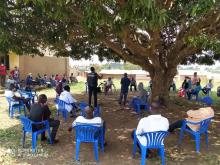Village Health Teams look for COVID-19 patients House-to-House in Kanungu District
Kampala, 21 September 2020:- In Bwindi village in Kanungu district southwestern Uganda, a team of four masked Village Health Team (VHTs) members armed with pens, notebooks and forms go knocking door-to-door checking on the health of people in the community. They are accustomed to this routine as they have been doing it for the last six months when COVID-19 was confirmed in the country.
The VHT team leader, David Twinomujuni goes about his job with outstanding resolve determined to achieve his mission. “We have to go to people’s homes to educate them on COVID-19, we have to ask them about their health and we just talk and record what they tell us on forms and then we submit to the district headquarters for follow up,” he explains.
Indeed Twinomujuni’s work and many others like him in Kanungu district feeds into the district COVID-19 surveillance system which in turn links with the national Integrated Disease Surveillance and Response (ISDR) system.
“The past five months have been brutally intense for us. We have to find these cases because if we don’t, we may end up with very many community infections. People are reluctant to report any signs related to Coronavirus, so we have to look, look and look everywhere using VHTs and other health workers,” says Dr. John Sebudde, the Kanungu District Health Officer.
“We have been identifying and evacuating possible cases of COVID-19 in our communities with the help of VHTs but it is not easy. Our ambulance has broken down many times and sometimes we have no fuel,” adds Dr Sebudde.
In Kanungu, just like in the rest of the country, VHTs are relied upon for community disease surveillance because they stay in the villages, they know the community well and are the first line of contact with the formal health sector. In that regard, VHTs have a critical role to play in the COVID-19 response.
“VHT work is tiresome but they continue working. With the help of community surveillance structures, the work is manageable but intense and very demanding,” concedes Katto Besisira the Kanungu District Surveillance Officer.
“I wake up early in the morning and we meet at the health centre or point of entry to discuss where each one of us will go, which cell or ward to go to, sometimes I don’t come back home until night time,” says Jane Ainembabazi, a VHT member stationed at Munyaga Point of Entry (PoE) on the border with the Democratic Republic of Congo.
These brave young women and men are at the forefront of Coronavirus surveillance in their communities. “When a patient at Kihiihi Health Center (IV) died, we had to increase our coverage to find his contacts and the VHTs helped us a lot,” says Frank Baguma, the health inspector of the area.
Before the COVID-19 pandemic, VHTs were allowed to treat some mild ailments but because of the COVID-19 pandemic, this has since changed but people continue to approach them with health problems such as stomach ache, headache and minor injuries.
“These days, I cannot touch sick people even when I want to help because I have to follow the guidelines. I record a few details. Sometimes people who have fever think its malaria but I still have to send an alert for COVID-19 to the district headquarters,” says Jane Twongyeire a VHT and triage staff at Munyaga PoE.
Of course, there are other challenges VHTs face in their communities while performing their duties as Loi Ssengoma testifies. “I have experienced a lot of finger-pointing, they even have a name for me in the village - mama corona. I don’t like it but I don’t mind it either. I just do my work as long as I help people,” she says.
To improve the work of the VHTs, support from the Irish Government and the African Development Bank has enabled the Ministry of Health and WHO to implement a training programme for VHTs to equip them with current COVID-19 knowledge in addition to reassuring them that they are a critical pillar in the fight against the disease. They have also been availed with telephone sets which have greatly improved community disease surveillance.
It is such contributions and support that drives David Twinomujuni and his team to continue knocking on doors, identify suspected cases and immediately report them to their superiors for action.
Health Promotion Advisor
Tel. : +256 414 335505
Cell: +256 772 507906
Email: sensasib [at] who.int
Public Information Officer
Tel. : +256 313 335569
Cell: +256 786 497073
Email: mwebembezie [at] who.int




